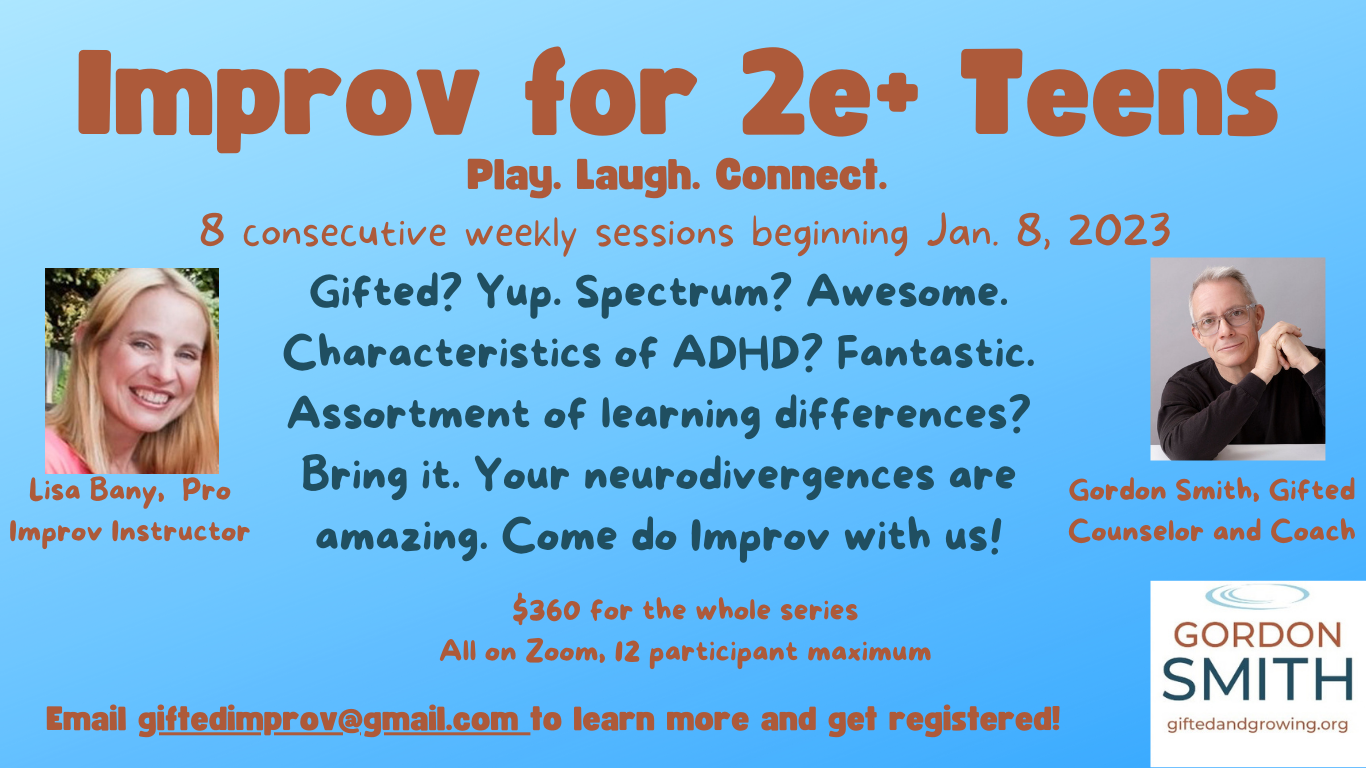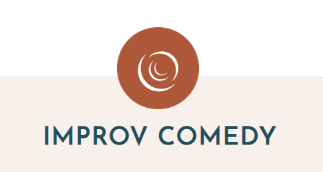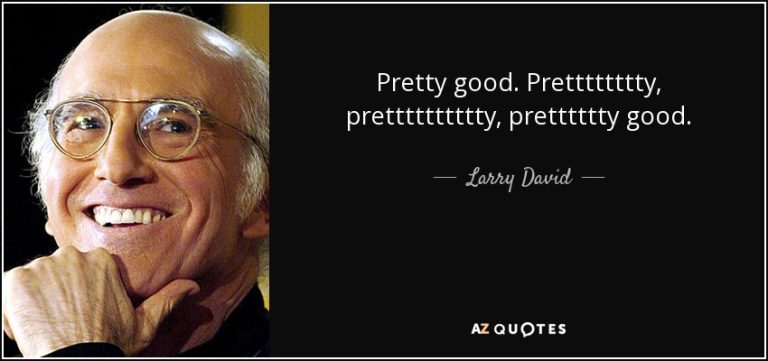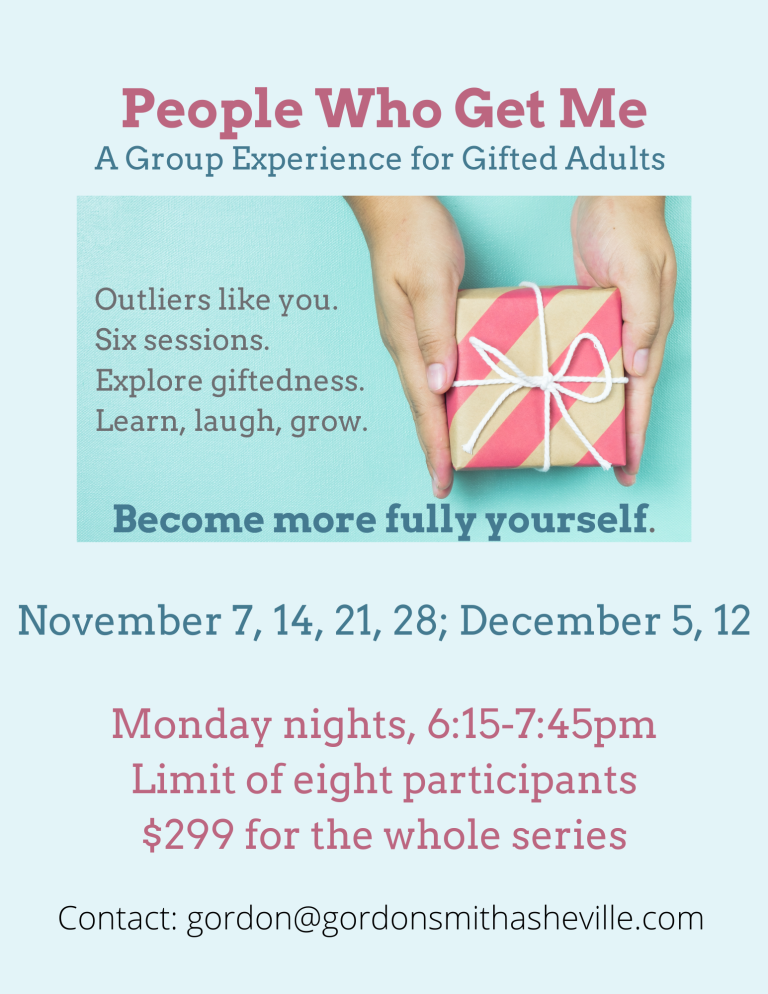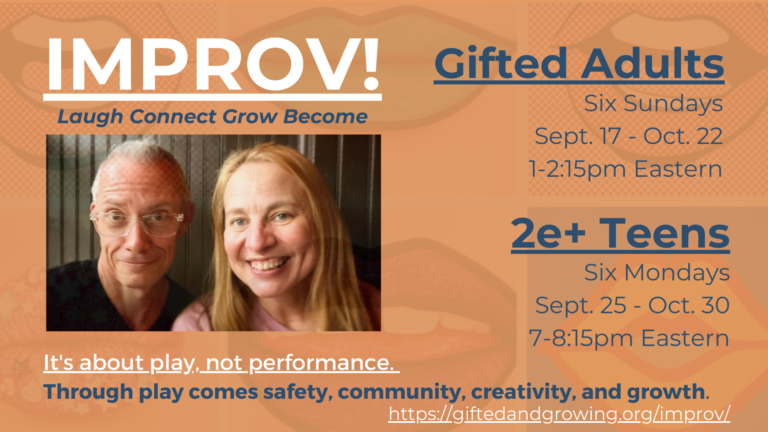Your teen walks through life with intensities – intellectual, sensual, physical, creative, emotional, existential. Some experience hyperfocus and can feel hyperscattered. They feel different from the neuromajority, and they’ve camouflaged to ‘fit in’. They want to feel connected to people, relax and laugh with them. They can be burdened with perfectionism and anxiety, and they love it when there is ease and flow. They’re complex, and they like complexity.
Improv for 2e+ Teens is a place where your teens can be themselves in all their facets. They’ll laugh and get to use all of their strengths. They’ll laugh some more and feel accepted no matter what happens. They’ll come to greater self-acceptance and self-trust. They will have the experience of shedding the masks they’ve worn.
Improv is built on two primary principles: Yes, And & Got Your Back. Yes, And means that whatever your teen brings will be received and built upon. Got Your Back means that the whole group will support each other to keep things flowing no matter what happens. There are no mistakes in Improv. We use everything. It’s not about trying to be funny. It’s about allowing the next thing to fall out of your mouth, and that’s what makes the funny! (More about What Improv Is and How It Helps is below.)
Gordon Smith of Gifted and Growing, and Lisa Bany, Chief Improv Officer of Improv Therapy Group have collaborated to develop an experience focused on the specific needs of Twice-Exceptional Teens. Gifted? Yup. Spectrum? Awesome. Characteristics of ADHD? Fantastic. Assortment of learning differences? Bring it. Your neurodivergences are amazing, and we want you to come out and play.
This class offers an eight-week experience in which we come together (on zoom) with 2e+ peers to explore, experiment, and play. Through Improv games and exercises we cultivate openness & playfulness, relaxation & self-care, emotional intelligence & empathy, and creative storytelling & expression.
Eight consecutive Sundays begin Jan. 8, 2023 from 1pm – 2:15pm Eastern Time.
$360 for the whole series.
Email me at giftedimprov@gmail.com to ask me anything and/or get registered! Subject Line: 2e Improv
LOTS MORE INFO BELOW
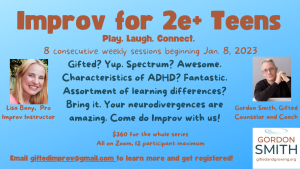
Improv, what it is and how it helps
Improv can be defined “as the form of theatre, often comedy, in which most or all of what is performed is unplanned or unscripted: created spontaneously by the performers.” Through a series of structured scenarios, participants contribute spontaneously. Improv operates under two central principles: “Yes, and” and “Got your back”. ‘Yes, and’ means that we accept whatever our scene partners are offering, and then build upon it. This principle creates a culture of acceptance, affirmation, and the impossibility of making mistakes. ‘Got your back’ means that your scene partners and ensemble are going to support you no matter what happens. This principle creates a culture that facilitates risk-taking, letting go of perfectionism, and trusting others.
I’ve been offering an Improv for Gifted Adults series for over a year. Most of the participants identified as 2e or 2e+, and we have seen remarkable results. In addition to folks coming back again and again, they have reported marked increases in self-trust, self-acceptance, cognitive flexibility, tolerance of uncertainty, social connectedness, and fun in their lives. They have also reported decreased anxiety, worry, and perfectionism. The strength of the community has led to friendships outside of the Improv structure, an ongoing Facebook community of current and past participants, and plans for future in-person gatherings to improvise and nurture these relationships.
Improv, the research
There is a lot of work yet to be done in this area, and we already have some research we can use. Here are some key takeaways from various studies:
Thera-prov: a pilot study of improv used to treat anxiety and depression
Conclusion: “The results of this study indicate that a brief intervention based on improv exercises may provide a strong and efficient treatment for patients with anxiety and depression.”
Social Competence Intervention Program (SCIP): A pilot study of a creative drama program for youth with social difficulties
“The treatment group showed significant improvement in key domains of observed social behavior in a natural setting compared to the clinical control group. Parents and children in the SCIP condition reported multiple positive changes in social functioning.”
“Yes, and”: Acceptance, Resistance, and Change in Improv, Aikido, and Psychotherapy
“Improv training, in particular, appears to be a powerful and relatively accessible way of incorporating a yes, and approach into daily life.”
Improvisational Theater Games as an Intervention for Anxiety, Depression and Perfectionism – Capstone Paper, University of Illinois at Chicago School of Public Health, Walter Watson Swift, April 18, 2017
“It is feasible to develop, conduct, and evaluate an improv intervention in the clinical treatment of anxiety and depression. Moreover, because improv directly harnesses uncertainty, it may be particularly useful with patients who live with high levels of Intolerance of Uncertainty.”
There are more studies available, and I hope this sampling provides you a general understanding that Improv based interventions are demonstrating significant improvements for its participants.
The Instructors
Lisa Bany is Chief Improv Officer at Improv Therapy Group. Lisa is also an instructor, director and coach at The Second City. She has authored numerous books, including On Stage: Theatre Games and Activities for Kids, which was awarded the Parent’s Choice Approval Seal for Excellence in Education, has been translated into German and Korean, and is sold around the world. She started teaching at The Second City in the early nineties and has directed and taught throughout the Chicagoland area. Lisa was one of the first teachers in the Second City Wellness Program where she has taught Improv for Anxiety, Improv for Parkinson’s Patients and their Caregivers, and Improv for the Autism Spectrum.
A graduate of Columbia College, Lisa has taught improv with The Association for Applied and Therapeutic Humor, The National Alliance on Mental Illness, and Arlyn School for teens with Anxiety and Autism Spectrum Disorder. She has also created and directed performing arts summer camp programs with Play On, Northlight Theatre, Light Opera Works and the JCCs of Chicago.
Gordon Smith is a Licensed Clinical Mental Health Counselor and Coach, who has been practicing since 2000. Gordon’s practice is composed of gifted and 2e+ adolescents and adults in locations around the world. He has presented at numerous conferences, including being a presenter at the 2020, 2021, and 2022 SENG Annual Conferences. Gordon has been teaching Improv since 2021 and hopes to expand the reach of Improv to as many gifted people as possible.
Improv for Twice-Exceptional Teens, format, structure, age range, technical needs, cost, and timeline
Improv for 2e Teens is an eight week experience on Zoom, conducted once weekly. In our experience, we’ve found that it takes up to six weeks for a group to reach their maximum cohesion. Successive group offerings, with new games and modules may be offered at the conclusion of the series.
Each session lasts 75 minutes and is composed of several different games each week – a warm-up, an ‘energy pass’, and several games in large and small groups. Each week has a theme, within which new games are played. Below is an example of the weekly themes:
● MAGIC WORDS: Communication and “Yes, and”
● GOT YOUR BACK: Trusting and showing up for others
● PERFECT IS BORING: Embracing Imperfection
● BRAIN YOGA: Cognitive Flexibility, Neuroplasticity and Memory
● I SECOND THAT EMOTION: Emotional Intelligence and Empathy
● OUR STORIES OURSELVES: Creative Storytelling and Expression
● FOLLOW THE FEAR: It’s OK to Fail
● IN THE NOW: Mindfulness and Being Present
Modules can be adapted from week to week and even within sessions depending on the needs of the group. One of the strengths of this modality is its inherent flexibility. Participants aged 13-17 would be invited to attend. Each participant will need a good internet connection, a video and audio enabled device that will allow them to see all participants, and a quiet, private space from which to attend. Minimum group size is six participants and maximum is twelve. Cost for the entire eight week series is $360 per participant.
Email Gordon Smith at giftedimprov@gmail.com to learn more and/or get your teen registered.

